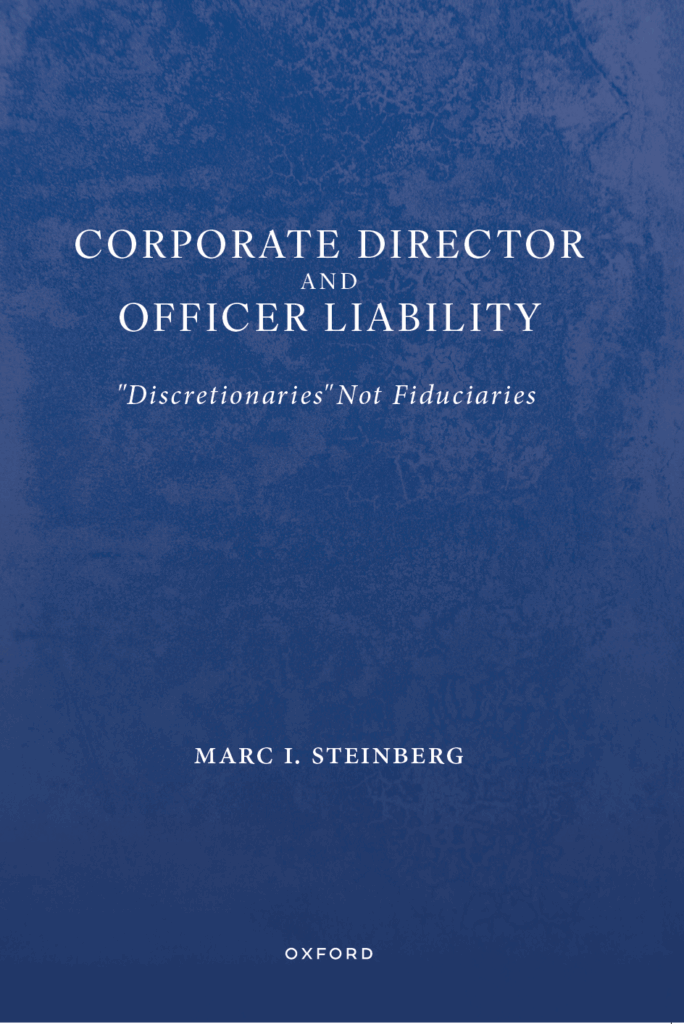I have enjoyed the privilege of being a chaired professor at Southern Methodist University for over 35 years. That’s a good run, which I hope to keep going for a long while. In teaching my corporate and securities law courses during that time, a key principle arises with frequency — namely, that corporate directors and officers are fiduciaries. These fiduciaries are charged with acting in their respective corporation’s best interests with due care and loyalty. If they fail to do so — according to the rhetoric — they will be held accountable and subject to liability exposure.
But is this merely rhetoric without substantive content? Is the term fiduciary a misnomer? In my Oxford University Press book published last month, I answer these questions with a resounding “yes.”
Please click here for more information on purchasing the book.

Based on the liability standards applied, corporate directors and officers are not fiduciaries. This is not necessarily a criticism of the current liability regime. It is simply stating the fact that these individuals are not fiduciaries. This inescapable conclusion prompted me to search for a new term that accurately describes the identity of corporate directors and officers. This new term is a neutral characterization: Corporate directors and officers are “discretionaries.” And so the title of my OUP book is Corporate Director and Officer Liability — “Discretionaries” Not Fiduciaries.
Identifying corporate directors and officers as discretionaries signifies that their liability exposure and the degree of deference extended to their conduct depend on the underlying facts and circumstances. At times, in many jurisdictions (such as Delaware), fiduciary standards apply — for example, in an interested director transaction that is neither approved by independent directors nor disinterested shareholders. But, in many instances, lax liability standards predominate. For illustration purposes, three examples follow.
First, the business judgment rule is one of the bedrock principles of U.S. company law. When applied to managerial and operational decisions, the rule makes good sense and good policy. After all, as stated over a century ago in Dodge v. Ford, judges are not business experts.
To have good faith decisions by directors and officers second-guessed and thereby subject these individuals to monetary liability for honest errors by hindsight may rightly be viewed as unacceptable. This point especially is true with respect to independent directors, many of whom would refuse to serve in these positions with the constant specter of liability. But, importantly, to rebut the presumption of the business judgment rule, gross negligence must be proven. This standard clearly is not fiduciary. Indeed, in other contexts, engaging in grossly negligent conduct may subject a person to punitive damages. Perhaps Delaware Vice Chancellor J. Travis Laster said it best in a recent decision: That it is harder for a plaintiff to rebut the presumption of the business judgment rule than it is for a prosecutor to procure a conviction for criminal negligence that results in imprisonment. This is a telling statement revealing that director and officer fiduciary status is a misnomer.
Second, where an interested director transaction is approved by disinterested and independent directors having adequate disclosure who act in good faith, the transaction cannot be challenged in many states, including Texas. Many of these transactions provide a material financial benefit to an insider, often the company’s CEO. Yet, these decisions cannot be challenged even if it can be shown that the independent directors acted with gross negligence in approving the transaction. In this setting, the commission of grossly negligent conduct by so-called fiduciaries is beyond judicial purview.
Third, the state exculpation statutes provide a vivid example. This is especially true with respect to the recently enacted Texas statute. In Texas, directors and officers of a publicly held company are not subject to monetary liability unless they engage in intentional misconduct, a knowing violation of law, an ultra vires act or fraud. This expansive exculpation statute is far afield from that resembling a fiduciary standard. To identify corporate directors and officers as fiduciaries in view of these lax liability standards belies reality.
My book provides many more examples. But the question should be asked: “Why does it matter?” After all, corporate directors and officers have been identified as fiduciaries for centuries. What difference does it make? Where’s the harm?
As discussed in my book, the answer is that the law should be truthful. That is a foundational principle. To call directors and officers fiduciaries yet apply liability standards that contravene the accepted meaning of this term is unacceptable. Moreover, a legal term should be applied consistently with its accepted meaning. Here, this is not the situation. And, last, many reasonable individual retail investors believe that, when they invest their funds in the stock market or in private transactions, that those who hold these titles are subject to meaningful standards. In fact, however, this is not the case in many situations.
Identifying corporate directors and officers as fiduciaries therefore presents a false portrayal. It is inimical to the rule of law and conflicts with reasonable individual investor expectations. Therefore, a neutral and accurate term merits adoption: Corporate directors and officers are “discretionaries.”
The book thus far has received favorable reviews from two former Delaware Supreme Court chief justices, a current Delaware vice-chancellor, highly respected practitioners and preeminent law professors in this country and abroad. It may be ordered on the Amazon and Oxford University Press websites. I am hopeful that this book will make a meaningful contribution to the development of the law and impact public policy in a positive manner.
Marc I. Steinberg is the Radford Chair in Law and Professor of Law at the Southern Methodist University Dedman School of Law. Professor Steinberg was an attorney at the SEC, serving in its Division of Enforcement and Office of General Counsel. He has been retained as an expert witness in several high-profile cases.
